On the 29th of June we keep the Feast of the great Apostles SS. Peter and Paul. It is a day of obligation; (in England, where this book was written) we have but few of these, and each of them commemorates something of very great importance. No other Apostle has his feast kept as a day of obligation—not even St. John, the dear ''disciple whom Jesus loved.'' Of course we feel quite sure that the Church must have had many and good reasons for choosing these two great saints of whom we are going to chat together for a little while. We know so much about St. Peter that the difficulty is where to begin. He was brought to our Blessed Lord by his brother Andrew, and it was on this occasion that Christ changed his name from Simon to Peter (the rock). Look at the first chapter of St. John, verses forty to forty-two; the story is told there so shortly and yet so beautifully. Perhaps some of us have to thank a dear brother for some great and wonderful thing which once came to our soul. One of my favourite texts in the Old Testament is this: "A brother that is helped by his brother is like a strong city" (Proverbs xviii. 19).
Have you many favourite texts? We cannot think of this meeting with its significant change of name without the other scene coming immediately to the mind, and with it the words: "Thou art Peter, and upon this rock I will build My Church" (St. Matthew xvi. 18).
Catholic children often know that our Lord made St. Peter the Head of the Church almost before they know anything else about him. Did you ever try to imagine how he felt when those words were said to him? Probably, however, he did not realize their meaning at the time, but after the Ascension, during the retreat in the Upper Room, where he was waiting for the coming of the Holy Ghost, I think he must have thought of them with something very like panic.
In Catholic days England was noted for its devotion to St. Peter. Do you think it was because his character appealed in a special way to Englishmen? It may have seemed to them that he shared some of the qualities which are supposed to be characteristic of our countrymen—his bluntness, his downrightness, his loyalty. After our Blessed Lady there were more churches dedicated to him in England than to any other saint. Is there an old "St. Peter's" near your home ? After the words of Jesus Christ Himself, the words of St. Peter form our favourite texts, and perhaps our favourite little prayers. Do you not love all these ?
"Lord, Thou knowest all things: Thou knowest that I love Thee" (St. John xxi. 17).
"Lord, to whom shall we go? Thou hast the words of eternal life " (St. John vi. 69).
"Thou art Christ the Son of the living God " (St. Matthew xvi. 16).
" Lord, save me " (St. Matthew xiv. 30)'
" Lord, if it be Thou, bid me come to Thee upon the waters " (St. Matthew xiv. 28).
You will learn to love this one better when you are older. Do you know of any others yourself ? Perhaps, too, we feel drawn towards St. Peter because he fell into a big sin, and denied his Master after he had made such grand promises, which is just what we do, not three times but over and over and over again. We feel he understands how weak our poor human nature is. He is one of the models of perfect contrition. The Gospel tells us that he went out of the High Priest's Hall weeping bitterly over his sin, and a legend says that his sorrow did not pass away as soon as he was forgiven, as ours so often does, but that he could never hear a cock crow without shedding tears, and in old age his cheeks were furrowed by their course. How we wish he would get us the grace to weep over our sins, instead of shedding tears perhaps only because we are not allowed to have our own way.
I am sure you know that St. Peter was a martyr. He was crucified, and, feeling himself unworthy to die like our dear Lord, he asked to be nailed to the cross with his head downwards; but do you know the pretty story, "Quo Vadis?"? St. Peter was escaping from Rome when our Blessed Lord, carrying His Cross, met him on the way. The Apostle, astonished, asked, " Whither goest Thou, Lord ?" And Jesus replied, "I am going to Rome to be crucified again." St. Peter understood, returned to Rome, and laid down his life for his Master.
You all love St. Peter, of course ! Have you ever thought that a real devotion to him means devotion and loyalty to his successor, to our Holy Father the Pope? This, too, was characteristic of England in Catholic times, and as you learn your history you will continually come across examples from the days of St. Augustine until England was torn away from Catholic unity. At the time of the Great Schism—the little ones will know nothing of that yet—when nearly every nation in Europe was hopelessly divided, England had the glory of remaining loyal to the true Pope. Many of our martyrs, like Blessed Thomas More and Blessed John Fisher, died in defence of the rights of the Holy See.
On this feast Catholic boys and girls should try to offer up Mass and Holy Communion for the Holy Father. They will no doubt have a very special love for the present Vicar of Christ, Pius X, because he has granted to children such special privileges; more than once I have heard him called "the children's Pope." You can prove your gratitude in many ways—by obeying his wishes and going often to Holy Communion, and by doing all you can to spread devotion to the Blessed Sacrament. You should also join with great
devotion in the prayer dedicating England to St. Peter, which is read at Benediction on the Sunday after his feast.
If you have a statue of St. Peter in your church you can kiss the foot as a little act of respect and submission. It will probably be a copy of the one in the great Church of St. Peter at Rome, which was kissed by St. Thomas Aquinas. Do you know that story ?
One day when he was in St. Peter's the Saint stopped betore the statue, kissed the foot, and then bent his head beneath it. A poor woman, suffering from an incurable disease, saw him, and bending down at the same moment kissed the hem of the white habit he wore. God rewarded the humility of both by healing the sick woman.
It is, however, at the Church of San Clemente in Rome that you would find the oldest known statue of St. Peter, and I think you would love it dearly. It is St. Peter as the Good Shepherd. He is carrying a sheep on his shoulders—not bearing the keys in his hands—and there seems a strange meaning in the fact that the little lamb is less maimed and broken than the shepherd.
We have said nothing about St. Paul, but in this we have, to a great extent, followed the example of the Church, who seems to forget him in favour of St. Peter on this their joint feast, making it up by keeping the "Commemoration of St. Paul" on the next day, the 30th of June, and you remember that we kept the beautiful feast of his conversion on the 25th of January.
Source: Wreaths of Feasts for the Little Ones, Imprimatur 1912
| peter.pdf |
| peter_and_paul_-_june_29th_2.pdf |
| peter_and_paul_-_june_29th.pdf |
| paul_the_apostle.pdf |
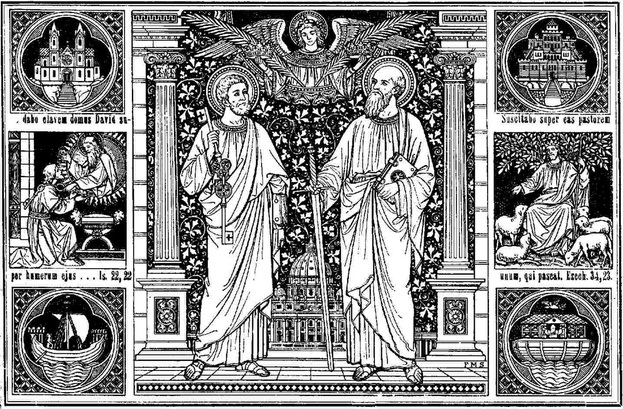
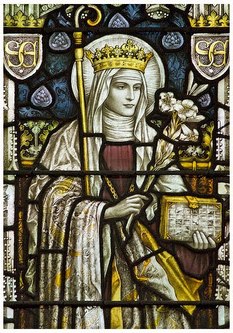
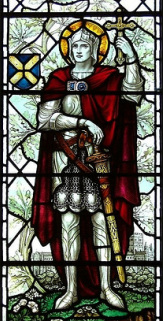
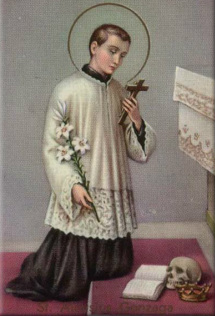
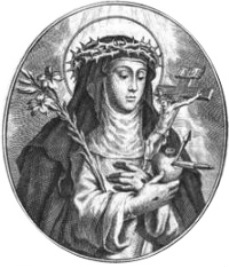
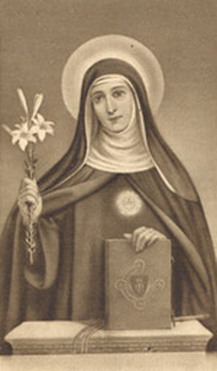
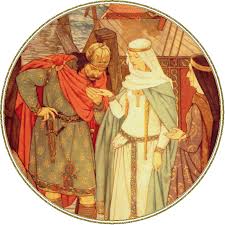
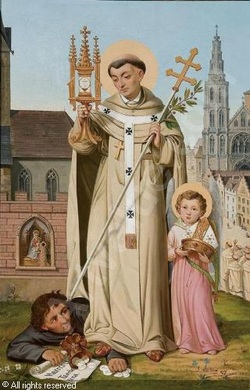
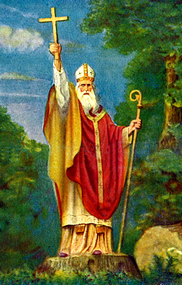
 RSS Feed
RSS Feed